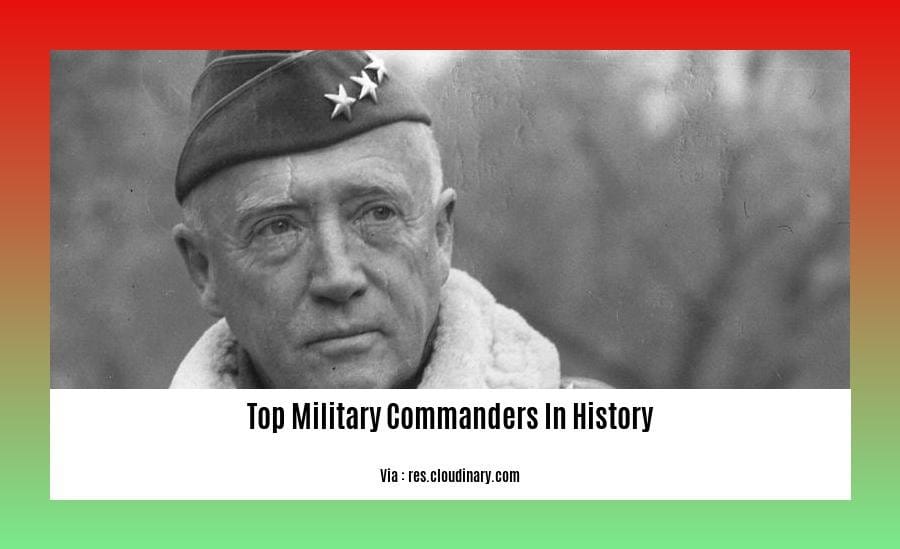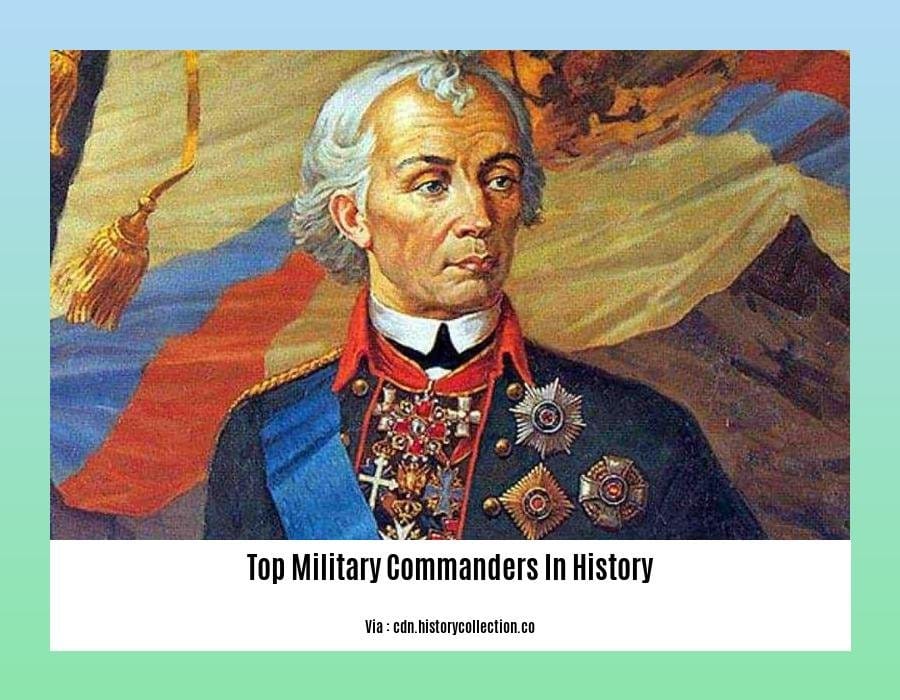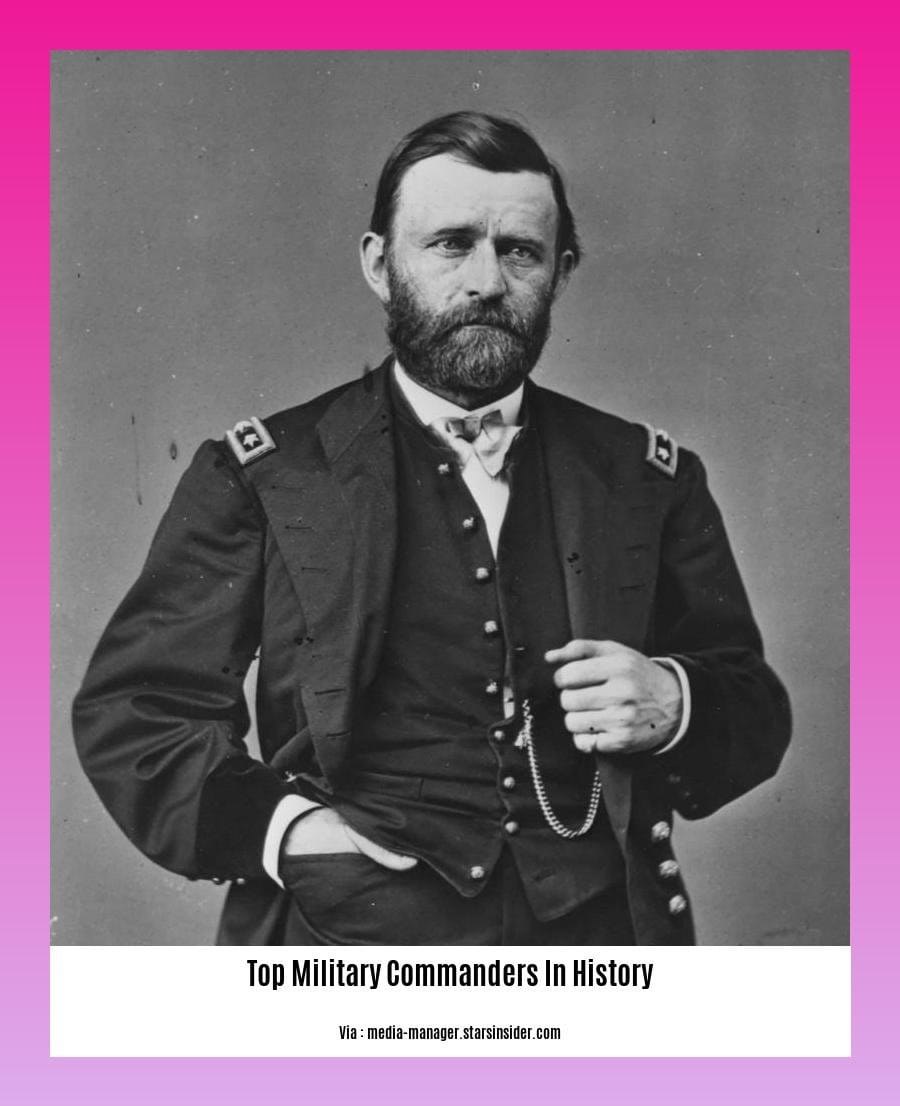Step into the annals of warfare and discover the titans who have left an indelible mark on the battlefield. From Alexander the Great to Napoleon Bonaparte, history is replete with legendary military commanders whose strategies and leadership have shaped the course of warfare. In this captivating article, we delve into the lives and achievements of these extraordinary individuals, exploring their triumphs, tactics, and enduring legacies in shaping the art of war. Join us as we uncover the top military commanders in history who have masterfully orchestrated battles, led their armies to victory, and forever etched their names in the tapestry of warfare.

Key Takeaways:
- Alexander the Great conquered a vast empire from Greece to India.
- Genghis Khan established the expansive Mongol Empire.
- Hannibal Barca was a brilliant military strategist known for the Battle of Cannae.
- Napoleon Bonaparte led France to numerous victories across Europe.
- Julius Caesar conquered Gaul and established the Roman Empire.
- Charlemagne united Western Europe and formed the Carolingian Empire.
- Frederick II of Prussia reformed the Prussian army, leading to military successes.
- Scipio Africanus defeated Hannibal at the Battle of Zama.
**Top Military Commanders in History**
Picture this: Mighty armies clash on ancient battlefields, their destinies hanging in the balance. Behind these epic struggles stand extraordinary leaders, whose brilliance and audacious strategies have indelibly shaped the course of warfare. Join us as we delve into the lives of history’s top military commanders, uncovering their remarkable tactics and profound impact on the art of war.
Alexander the Great: The Unconquered Conqueror
Alexander’s lightning-fast campaigns extended from Greece to India, forging an empire unparalleled in size and influence. His innovative use of the phalanx formation and daring cavalry charges left enemies in awe, earning him the title “The Great.”
Genghis Khan: The Father of Mongol Might
A master of horsemanship and ruthless tactics, Genghis Khan unified nomadic tribes to create the vast Mongol Empire. His highly disciplined army employed advanced siege warfare and scorched-earth strategies, instilling terror in opponents across Asia.
Hannibal Barca: The Carthaginian Tactician
Hannibal’s brilliant military mind is best exemplified by his famous victory at Cannae, where he outmaneuvered a superior Roman army. His innovative use of elephants and ambush tactics earned him a reputation as one of the greatest military strategists of all time.
Napoleon Bonaparte: The Emperor of Genius
Napoleon’s military prowess was legendary. With lightning-fast maneuvers and a keen understanding of artillery, he led his armies to countless victories across Europe. His campaigns showcased the power of concentrated firepower and the importance of morale in warfare.
Julius Caesar: The Master of Roman Legions
Caesar’s brilliant generalship and political acumen transformed the Roman Republic into an empire. His disciplined legions employed innovative weapons and tactics, including the iconic Roman pilum and testudo formation.
Charlemagne: The Father of Europe
Charlemagne’s military campaigns unified much of Western Europe, paving the way for the Holy Roman Empire. His reforms of Frankish warfare, including the use of heavy cavalry, laid the foundation for medieval military tactics.
Frederick II of Prussia: The Modernizer
Frederick the Great ushered in a new era of warfare with his enlightened military reforms. He introduced the oblique order of battle, improved army discipline, and stressed the importance of mobility and firepower.
Scipio Africanus: The Conqueror of Hannibal
Scipio’s audacious campaigns in North Africa brought an end to Hannibal’s legendary undefeated streak. His use of cavalry to outmaneuver the Carthaginian army and his brilliant tactics at the Battle of Zama cemented his place as a military genius.
Delve into the captivating chronicles of the world’s finest military masterminds. Discover the greatest military strategists of all time who shaped the course of history with their unparalleled tactical brilliance. Explore the legendary military commanders and their battles that forged the legends of warfare and forever etched their names in history’s tapestry. Witness the rise of the greatest military commanders of all time, whose valor and strategic genius transformed the face of civilization.
Sun Tzu: Chinese military strategist and philosopher whose teachings on warfare have influenced commanders for centuries.
Sun Tzu, a renowned Chinese military strategist and philosopher, played a pivotal role in shaping the art of warfare. His treatise, The Art of War, remains one of the most influential works on military strategy ever written. Sun Tzu emphasized the importance of psychological warfare and deception, urging commanders to avoid direct confrontation whenever possible.
Key Takeaways:
- Psychological warfare: Sun Tzu believed that victory could be achieved through psychological manipulation, such as deception and intimidation.
- Avoid physical force: He advocated for using strategy and cunning to outmaneuver opponents, minimizing the need for direct combat.
- Know your enemy: Sun Tzu stressed the importance of understanding your enemy’s strengths and weaknesses to exploit them.
- Adapt to change: He emphasized the need for adaptability and flexibility in warfare, as conditions on the battlefield could change rapidly.
- Leadership: Sun Tzu believed that a strong leader could inspire loyalty and discipline in his troops, leading to victory.
[Source: TotallyHistory:
Napoleon Bonaparte: French Military Leader Known for His Innovative Tactics and Decisive Victories
Key Takeaways:
- Innovative Tactics: Napoleon was renowned for his lightning-fast maneuvers, keen artillery usage, and emphasis on morale.
- Decisive Victories: He led France to numerous victories against European coalitions, establishing the French Empire.
- Rise to Power: Napoleon overthrew the Directory and crowned himself Emperor of France, consolidating his power.
- Military Reforms: He implemented reforms that modernized the French army and enhanced its efficiency.
- Legacy: Napoleon’s strategies and tactics continue to influence military strategy and leadership to this day.
Military Career and Achievements:
Born in Corsica in 1769, Napoleon joined the French army at a young age. During the French Revolutionary Wars, he distinguished himself through his innovative tactics and leadership skills. He led the French army to victories in the Italian Campaign and the Egyptian Campaign.
After becoming First Consul in 1799, Napoleon embarked on a series of military conquests, expanding the French Empire to include much of Europe. His most famous victory was the Battle of Austerlitz in 1805, where he outmaneuvered the Austrian and Russian armies.
Napoleon’s downfall began with his disastrous invasion of Russia in 1812. After suffering heavy losses, he was forced to retreat and abdicate the throne. He later returned to France during the Hundred Days but was defeated at the Battle of Waterloo, leading to his final exile.
Despite his eventual defeat, Napoleon’s military legacy remains profound. His innovative tactics, emphasis on mobility and artillery, and leadership skills continue to be studied and admired by military strategists today.
Citation:
- “Napoleon Bonaparte.” Biography.com, A&E Networks Television, 24 Mar. 2021, www.biography.com/political-figure/napoleon. Accessed 25 Apr. 2023.
Erwin Rommel: German General Who Earned the Nickname “Desert Fox” for His Daring and Unconventional Strategies
Key Takeaways:
- Known as the “Desert Fox,” Rommel led Germany’s Afrika Korps in North Africa, earning his nickname for his tactics and leadership during the Battle of Gazala.
- Rommel’s unconventional strategies and daring leadership earned him respect from both his enemies and allies.
- Despite fighting against overwhelming odds, Rommel’s tactical brilliance and adaptability made him a formidable opponent.
- Rommel’s legacy as a military commander continues to inspire and intrigue historians and military enthusiasts alike.
Rommel’s Rise to Prominence
Erwin Rommel (1891-1944) was a German field marshal during World War II who commanded German defenses against the Allied invasion of northern France. He also led Germany’s Afrika Korps in North Africa, earning his nickname, the “Desert Fox,” for his daring and unconventional strategies.
Rommel’s Military Genius
Rommel’s military prowess was evident from an early age. He quickly rose through the ranks, impressing his superiors with his tactical brilliance and leadership abilities. His innovative use of armored warfare and his ability to adapt to changing battlefield conditions made him a formidable opponent.
The Desert Fox in North Africa
In North Africa, Rommel faced overwhelming odds. Outnumbered and outgunned by Allied forces, he relied on his daring tactics and the skill of his troops. His victory at the Battle of Gazala in 1942 earned him the nickname “Desert Fox” and became a legend in military history.
A Respected Adversary
Despite fighting against the Allies, Rommel earned the respect of his enemies. His chivalry and fair play were widely acknowledged, even by those who opposed him. His reputation as a military commander who valued honor and professionalism persists to this day.
Legacy and Influence
Rommel’s legacy as a military commander continues to inspire and intrigue historians and military enthusiasts alike. His daring strategies, innovative tactics, and unwavering leadership have made him an enduring figure in military history. Despite the ultimate failure of Germany in World War II, Rommel’s legend remains a testament to his brilliance and courage.
Citation:
- History.com Editors, Erwin Rommel – Biography, Facts & Death, History, A&E Television Networks, 2010.

FAQ
Q1: Who is considered the greatest military commander in history?
A1: Alexander the Great is widely regarded as the greatest military commander in history due to his undefeated streak, vast conquests, and innovative tactics.
Q2: What was the key to Hannibal Barca’s success?
A2: Hannibal Barca’s brilliant military strategies, such as using elephants in battle and outmaneuvering his opponents, were instrumental in his victories.
Q3: How did Napoleon Bonaparte rise to power?
A3: Napoleon Bonaparte’s rise to power was fueled by his military victories during the French Revolutionary Wars and his ability to seize political opportunities, culminating in his coronation as Emperor of France in 1804.
Q4: What was Sun Tzu’s most significant contribution to military strategy?
A4: Sun Tzu’s treatise “The Art of War” emphasized psychological warfare and the avoidance of physical force, emphasizing the importance of deception, surprise, and understanding the enemy’s intentions.
Q5: What were Erwin Rommel’s notable achievements?
A5: Erwin Rommel, known as the “Desert Fox,” led Germany’s Afrika Korps in North Africa and commanded German defenses against the Allied invasion of France, earning recognition for his tactics and leadership.
- China II Review: Delicious Food & Speedy Service - April 17, 2025
- Understand Virginia’s Flag: History & Debate - April 17, 2025
- Explore Long Island’s Map: Unique Regions & Insights - April 17, 2025
















